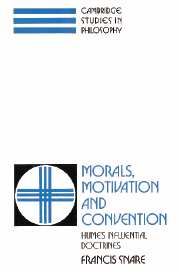Book contents
- Frontmatter
- Contents
- Acknowledgements
- NOTE
- Introduction
- Part I The argument for sentimentalism
- Part II The problems and consequences of sentimentalism
- 6 Continuity and circularity
- 7 The problem with justice
- 8 The conservative theory of justice
- 9 Convention and institutional facts
- 10 Convention and the regard to justice
- Bibliography
- Index
8 - The conservative theory of justice
Published online by Cambridge University Press: 05 June 2012
- Frontmatter
- Contents
- Acknowledgements
- NOTE
- Introduction
- Part I The argument for sentimentalism
- Part II The problems and consequences of sentimentalism
- 6 Continuity and circularity
- 7 The problem with justice
- 8 The conservative theory of justice
- 9 Convention and institutional facts
- 10 Convention and the regard to justice
- Bibliography
- Index
Summary
Most of the core of Hume's theory of ‘the rules of justice’ is contained in the section ‘Of the Origin of Justice and Property’ (III,ii,2). Rather than a theory of ‘justice’ in the ordinary sense, we may think of it as a theory of those judgments of moral obligation we make which pose ‘hard cases’ for Humean meta-ethical sentimentalism. As a requisite preliminary, Hume gives us a description of ‘the circumstances of human nature’ without which rules of justice would be unnecessary and with which it is virtually a human necessity. Next, Hume gives an account of how our having ‘rules of justice’ can be accounted for as a socio-psychological fact, given these circumstances of human nature. Because this account employs the notion of social ‘conventions’, Hume must then give us some account of ‘convention’. Finally, Hume gives an account of the sentiment we have which approves of compliance, and of the motive to comply, with such rules. It is an account of‘the regard to justice as such’.
TWO REDUCTIVE PROJECTS
The story Hume gives can, of course, be interpreted in ways which are an embarrassment to contemporary Humeans and which also tend to make Hume's discussion look discontinuous. It may look as if Hume has changed the subject of discussion from the defence of sentimentalism to either bad anthropology or else substantive normative ethics. For example, despite Hume's own disclaimers (493), Hume's account can look like a story about historical origins, as a story about a pre-history where men found it useful to ‘remedy’ certain problems by ‘establishing’ conventions.
- Type
- Chapter
- Information
- Morals, Motivation, and ConventionHume's Influential Doctrines, pp. 202 - 245Publisher: Cambridge University PressPrint publication year: 1991

